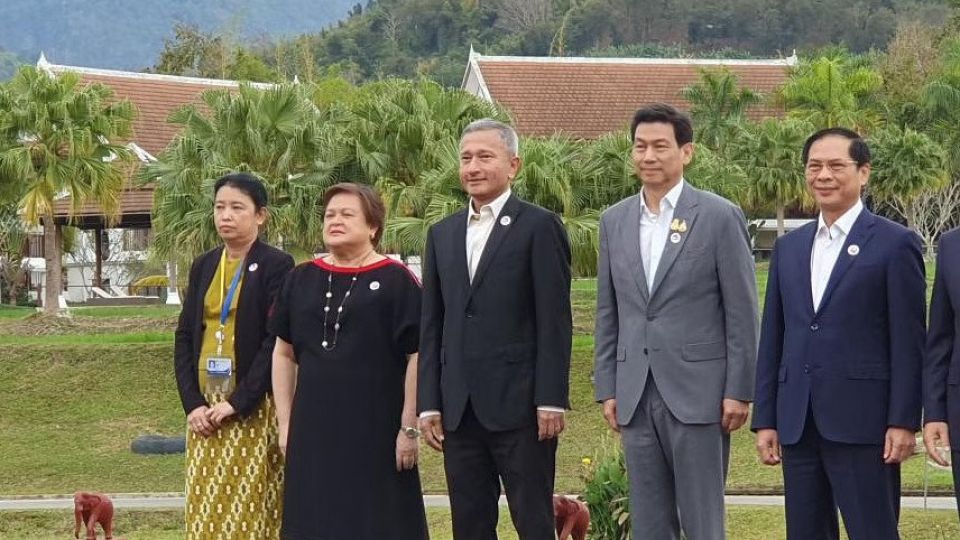January 30, 2024
LUANG PRABANG – Laos – Myanmar’s military junta on Jan 29 sent a senior official to take part in the Asean Foreign Ministers’ Retreat in Laos, after having been barred from sending political appointees to high-level meetings of the regional bloc since the 2021 coup.
While Laos, which is chairing Asean in 2024, called this a small but positive sign that its engagement with Myanmar may work, it warned that a resolution to the Myanmar crisis remained a distant prospect.
“We feel a little bit optimistic that the engagement may work, although we have to admit that the issues that are happening in Myanmar will not be resolved overnight,” Laos Foreign Minister Saleumxay Kommasith told reporters after the closed-door meeting concluded.
The Myanmar official in question was Ms Marlar Than Htaik, the permanent secretary of the foreign ministry under the control of the junta. Prior to her attendance, Myanmar’s seat had been left empty at Asean leaders’ and foreign ministers’ meetings, as the junta considered the lower-level representation imposed by Asean a snub.
When approached by The Straits Times, Ms Marlar Than Htaik directed questions about the meeting to Laos. A member of her delegation indicated that Myanmar aimed to continue such participation in future Asean meetings.
Singapore Foreign Minister Vivian Balakrishnan described the discussions as “friendly, candid, constructive”, and said they were directed towards keeping lines of engagement open with all sides to help bring about peace in Myanmar.
But he cautioned that Ms Marlar Than Htaik’s participation was “simply a fulfilment” of Asean’s longstanding invitation since the coup to have Myanmar send a non-political representative.
“We do not approve of what’s happening,” he said, referring to the violent crisis that has unfolded since the 2021 coup. “In fact, three years later, the situation in Myanmar – the security situation, the safety of people, the economy – actually is worse than it was three years ago.
“Nevertheless, the key point remains. They need national reconciliation. They need to speak to each other. Asean stands ready as a neighbour, as a fraternal association, to be helpful and constructive, not to make things worse.”
Escalating military clashes have swelled Myanmar’s internally displaced population to 2.6 million as at the end of 2023.
Criminal syndicates, meanwhile, have exploited the political vacuum created by the turmoil in Myanmar to ramp up the production of narcotics and run online scams targeting the region and beyond.
Asean has not been able to make much headway on its three-year-old blueprint towards a resolution in the country. The plan called for an end to violence in the country, the appointment of an Asean special envoy who would then meet all relevant stakeholders, as well as the provision of humanitarian aid to Myanmar.
The current Asean special envoy to Myanmar, veteran Laotian diplomat Alounkeo Kittikhoun, has held meetings with Myanmar junta leader Min Aung Hlaing as well as Ms Zin Mar Aung, Foreign Minister of the rival National Unity Government.
In view of the junta’s resistance towards Asean’s peace plan, the bloc had limited Myanmar’s representation at certain high-level meetings to non-political appointees, essentially shutting out Senior General Min Aung Hlaing and its foreign minister Than Swe.
The junta responded by not sending a senior official in their place, which meant Myanmar was not represented at these meetings until Jan 29.
Meanwhile, Asean foreign ministers also had a “delicate but sincere and candid” discussion about the war in Gaza, revealed Dr Balakrishnan.
An Israeli military offensive triggered by an Oct 7 attack by Hamas – the militant Palestinian group governing Gaza – has killed more than 26,000 people so far, says Gaza’s Health Ministry. About 130 hostages, including eight Thais, are still held by Hamas in Gaza.
On Jan 26, the International Court of Justice said Israel must prevent genocidal acts in Gaza and allow humanitarian aid into the area. Israel, which has vowed to crush Hamas, plans to continue its military campaign.
Dr Balakrishnan said that while there were some differences in perspectives among the Asean countries on Gaza, they agreed on the need to follow international humanitarian law, to call out terrorism and harm of innocent civilians – whatever the pretext or excuse – and also to have Hamas release the hostages unconditionally.
“The other important point is that all of us agree that the only way forward is a negotiated two-state solution, which has to come from honest-to-goodness conversations across the table, good faith negotiations between the Israelis and the Palestinians,” he said.
This agreement on the fundamentals “reaffirms Asean cohesion, Asean unity, consensus on key points”, he said.


